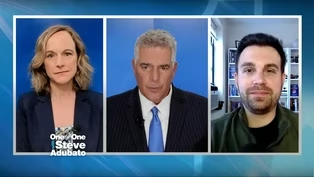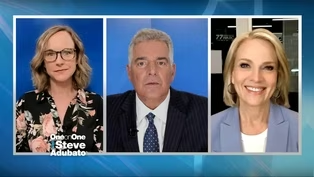One-on-One
The Importance of Behavioral Health Today
Clip: Season 2023 Episode 2626 | 6m 58sVideo has Closed Captions
The Importance of Behavioral Health Today
Steve Adubato talks with Robert C. Garrett, CEO of Hackensack Meridian Health, about behavioral health and the state of healthcare today.
Problems playing video? | Closed Captioning Feedback
Problems playing video? | Closed Captioning Feedback
One-on-One is a local public television program presented by NJ PBS
One-on-One
The Importance of Behavioral Health Today
Clip: Season 2023 Episode 2626 | 6m 58sVideo has Closed Captions
Steve Adubato talks with Robert C. Garrett, CEO of Hackensack Meridian Health, about behavioral health and the state of healthcare today.
Problems playing video? | Closed Captioning Feedback
How to Watch One-on-One
One-on-One is available to stream on pbs.org and the free PBS App, available on iPhone, Apple TV, Android TV, Android smartphones, Amazon Fire TV, Amazon Fire Tablet, Roku, Samsung Smart TV, and Vizio.
Providing Support for PBS.org
Learn Moreabout PBS online sponsorship(upbeat music) - I wanna welcome Bob Garrett, CEO of Hackensack Meridian Health.
Good to see you, Bob.
- Good to see you too, Steve.
Put it in context, please.
- Yeah, so unfortunately we're seeing significant increases in violence at our hospitals and in schools, in society in general.
The stats are really overwhelming, Steve.
It's really, and I just, I just shake my head when I think about this but gun violence now is the biggest killer of children in the US, which is really staggering.
48,000 people in the US died by gunfire last year.
So we've declared it, along with 50 other health systems across the country, as a public health emergency.
And what we're trying to do is certainly prevent it wherever possible.
- Oh, I'm sorry, Bob, why do you think there's such an uptick?
- Well, I think, I think part of it has to do with the pandemic and the mental health issues that have related, have been a result of that pandemic.
- Right.
- I think that's certainly a major factor, Steve.
But we actually saw the number of violent incidents going up even before the pandemic, so it was going in that direction.
But I think the pandemic certainly exacerbated those trends.
So what we're focused on is prevention and then we're also focused on being able to help victims and their families of gun violence.
So on the prevention side, again, we have signed a pledge along with 50 other health systems across the country.
We're part of a consortium that is being led out of Northwell Health in New York.
And what we're trying to do is find strategies to help prevent gun violence and we think by declaring it a public health emergency, maybe staying out of the politics related to the Second Amendment and guns, but just understanding that whatever your position is on the Second Amendment, this is a public health emergency and we have to, whether you're a gun owner or you're not a gun owner, we have to take steps to try to prevent this senseless killing, particularly of of young people like children and adolescents.
So we're working with these other health systems to find the right strategies, but we also have put in programs that help victims of gun violence as well.
- Bob, sorry for interrupting, we actually, I'm sorry for interrupting, we actually had one of your physician leaders engaged in something called Project Heal.
- Yes.
- What is that and how is it connected to the fight against prevention of violence as a public health issue?
- So Project Heal actually is a program that helps victims of gun violence or their families.
So it's a program that's funded through federal funds as well as state funds.
And we set up Project Heal at Jersey Shore University Medical Center.
We hope to expand it at some of our other sites but what it does is we help those victims by referring them to the right help.
They might need behavioral health types of assistance, they might need social assistance, they might need additional medical assistance.
Also, it's a crisis for their families so we also make referrals for their families.
And I'm happy to say the program just celebrated its two year anniversary and we've already helped over 400 families, which is really, really significant.
And we're hoping that because it's been so successful that we can demonstrate that it's a model that should be replicated not just throughout New Jersey, but throughout the country.
And we're gonna start at Hackensack Meridian by offering it at some of our other hospitals as well.
- It's so interesting.
First I'm gonna disclose a couple things.
One, that I teach in the Hackensack Meridian Health Physician Leadership Academy, and I've gotten to know many of the physicians there, many of whom are involved in dealing with those who are victims of violence.
And also that HMH is a long longtime underwriter of our programming with Bob.
One more quick follow up on this.
You talked in our previous interview about fiscal challenges, long-term fiscal challenges at HMH and other healthcare systems, hospital systems across the nation face.
A lot of it, much of it COVID related.
But you're also now talking about violence as a public health issue, which only expands upon the demands of hospitals and hospital systems.
Is there a disconnect between A, the need to cut expenses, be more fiscally conservative while you're expanding programs to deal with public health issues like violence?
- There's a tremendous disconnect there.
And our mission is to transform healthcare, it's to improve the health of our communities.
And a public health crisis like gun violence and violence in general is something that's near and dear to our mission.
So we have to, we have to continue to fund programs like that, but that's why we're asking for assistance from our partners, whether it be the state government, the federal government, to fund programs like Project Heal because these are tough times for healthcare networks and for hospitals.
But honestly, as you're pointing out, the demand for these types of services and this type of help is incredible.
There's never been more of a need for it than now.
- And that also includes behavioral health, mental health issues, violence, a whole range of issues.
Bob Garrett is the Chief Executive Officer of Hackensack Meridian Health.
Bob I wanna thank you so much for taking the time to talk with us.
- Thanks for having me, Steve.
- You got it.
Stay with us, we'll be right back.
- [Narrator] One-On-One with Steve Adubato has been a production of the Caucus Educational Corporation.
Funding has been provided by Seton Hall University.
MD Advantage Insurance Company.
New Jersey Sharing Network.
The New Jersey Education Association.
PSC.
NJM Insurance Group.
Choose New Jersey.
The Adler Aphasia Center.
And by Delta Dental of New Jersey.
Promotional support provided by ROI-NJ.
And by Meadowlands Chamber.
- Are you looking to be a part of a dynamic, forward-thinking business service organization?
At Meadowlands Chamber, every day we connect, collaborate and innovate, helping to drive business and economic growth in the greater Meadowlands and New Jersey.
I invite you to visit our Meadowlands Chamber headquarters, an open office facility with access to resources for our members' businesses and networking needs.
Together, we will build the chamber of the future, and the next generation of leaders.
Author Discusses the Houston Astro's Cheating Scandal
Video has Closed Captions
Clip: S2023 Ep2626 | 11m 7s | Author Discusses the Houston Astro's Cheating Scandal (11m 7s)
Talk Host of 77WABC Provides Tips on Living a Positive Life
Video has Closed Captions
Clip: S2023 Ep2626 | 9m 53s | Talk Host of 77WABC Provides Tips on Living a Positive Life (9m 53s)
Providing Support for PBS.org
Learn Moreabout PBS online sponsorship
- News and Public Affairs

Top journalists deliver compelling original analysis of the hour's headlines.

- News and Public Affairs

FRONTLINE is investigative journalism that questions, explains and changes our world.












Support for PBS provided by:
One-on-One is a local public television program presented by NJ PBS

